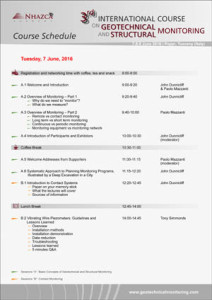Course
The 2016 edition, again under the direction of John Dunnicliff and organized by Paolo Mazzanti, will follow the same general format of the 2015 course.
Leading experts from all over the world will contribute with their lectures to one of the most advanced and high professional course ever organized about Geotechnical and Structural Monitoring.
In the next edition three special sessions will be dedicated to the presentation of the new trends on geotechnical and structural monitoring, by course Partners and in particular:
- New Trends in Contact Monitoring
- New Trends in Remote Monitoring
- New Trends in Offshore Monitoring and Data Transmission and Management
More details about this sessions are available here…
Furthermore, 10 challenging Case Histories were selected by a call for presentation dadicated to the course participant.
More details about this sessions are available here…
Take a look to the Official Extended Schedule of the 2016 Edition.
Several companies are expected to attend the 2016 edition of the course to show their innovative solutions equipment for geotechnical and structural monitoring.
List of Partners and Exhibitors already confirmed for the 2016 Edition
Topics
This is a course for practitioners, taught by practitioners with wide field experience. The emphasis is on why and how to monitor field performance.
The course will cover the following main topics:
- Basic concepts of monitoring and planning
- Contact Monitoring methods
- Remote Monitoring methods
- Vibration Monitoring
- Offshore Monitoring
- Management, analysis and interpretation of data
- Interactive sessions
- Case-histories, given by international leading experts
- Open forum
Who should attend
The course is intended for engineers, geologists and technicians who are involved with performance monitoring of geotechnical features of civil engineering projects, project managers and other decision-makers who are concerned with management of RISK during construction of these and other project types:
- Large and small infrastructures
- Tunnels
- Dams
- Excavations
- Excavated and natural slopes
- Building foundations
- Transportation
- Mining
- Oil and gas
- Land and water management
Why attend
- To learn the who, why and how of successful geotechnical monitoring
- To meet with leading manufacturers of geotechnical instrumentation, each of whom will have displays of instruments
- To ensure that your monitoring programs are tailored to match your specific geotechnical questions
- To avoid the common problem of poor quality data
- To participate in discussions with instructors and other attendees
